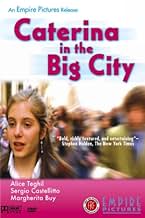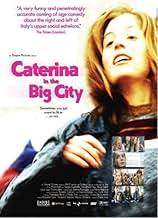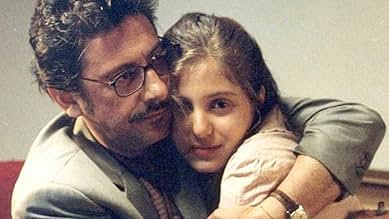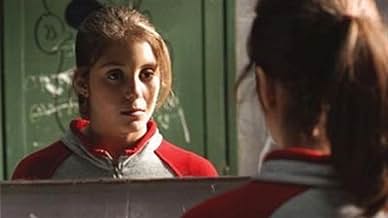IMDb-BEWERTUNG
6,8/10
3255
IHRE BEWERTUNG
Die dreizehnjährige Caterina zieht mit ihren Eltern nach Rom, wo sie sich mit den Komplikationen des Lebens in der großen Metropole konfrontiert sieht.Die dreizehnjährige Caterina zieht mit ihren Eltern nach Rom, wo sie sich mit den Komplikationen des Lebens in der großen Metropole konfrontiert sieht.Die dreizehnjährige Caterina zieht mit ihren Eltern nach Rom, wo sie sich mit den Komplikationen des Lebens in der großen Metropole konfrontiert sieht.
- Regie
- Drehbuch
- Hauptbesetzung
- Auszeichnungen
- 7 Gewinne & 9 Nominierungen insgesamt
Zach Wallen
- Edward
- (as Zach -James Smith- Wallen)
Margerita Mazzola
- Martina
- (as Margherita Mazzola)
Martina Tasquetta
- Alessia
- (as Martina Taschetta)
Giulia Gorietti
- Giada
- (as Giulia Elettra Gorietti)
Empfohlene Bewertungen
I think Virzì is one of the most interesting director in Italy, at the present moment. His ability to portray the current Italian society is quite good, and he achieves this either with *characters* (the two families in "Ferie d'Agosto", the father in "Caterina va in città") and with *stories* (the story of "Ovosodo", a bit of an Italian "It's a wonderful life"... just a bit, obviously... :-).
"Caterina va in città" is a good movie: the idea of showing chunks of the Italian society and habits through the eyes of an innocent teenager gives the movie a "fairy tale" twist that makes it really "light" and enjoyable. I also liked the mom's character, played by a really good and beautiful Margherita Buy: in general, I appreciated Virzì's idea that the "good" part of society is based on the strength of women, as all male characters in this movie either are donquixotesque losers or spoiled and arrogant over-grown babies.
But, as for most of his movies, I think the same criticism again apply: Virzì is openly a left-wing director, but he stresses this a bit too much and sometimes its works sound too "ideological": art should make you think, not tell you what to think, I guess. In addiction, some characters are too stereotypical and don't come out of a really deep psychological analysis. Still, I think he is currently the director who knows best how to take on the screen what goes on in Italy.
In conclusion, I think this movie - just like "Ovosodo" - is based on a simple yet powerful assumption: that happiness is the disease of the idiots...
"Caterina va in città" is a good movie: the idea of showing chunks of the Italian society and habits through the eyes of an innocent teenager gives the movie a "fairy tale" twist that makes it really "light" and enjoyable. I also liked the mom's character, played by a really good and beautiful Margherita Buy: in general, I appreciated Virzì's idea that the "good" part of society is based on the strength of women, as all male characters in this movie either are donquixotesque losers or spoiled and arrogant over-grown babies.
But, as for most of his movies, I think the same criticism again apply: Virzì is openly a left-wing director, but he stresses this a bit too much and sometimes its works sound too "ideological": art should make you think, not tell you what to think, I guess. In addiction, some characters are too stereotypical and don't come out of a really deep psychological analysis. Still, I think he is currently the director who knows best how to take on the screen what goes on in Italy.
In conclusion, I think this movie - just like "Ovosodo" - is based on a simple yet powerful assumption: that happiness is the disease of the idiots...
I wish I could say that this was a great film because there really were a lot of things that one could like about it.
As it turns out, however, it is a good, but flawed film. I will give this film a recommendation, I think it is worth seeing.
The film made a number of incredible social statements. It really cuts to the quick about the nature of society, the people who can manipulate the system on both sides are in collusion with each other to keep their privilege. The people who are on the outside find themselves on the outside, looking in. They can be taken under someone's wing but they are never really more then a pet, the Jimmy Olsen to someone's Superman.
The film had spectacular acting, particularly from the lead.
So what then keeps the film from being great? One of the biggest problems comes from the episodic and picaresque structure of the film. It has the kind of structure that is more interesting because of its discontinuity then because of its continuity. And while it makes for a lot of interesting discussions, this could turn a lot of people off, probably even more then the subtitles.
Honestly, the problem is that it begins with Caterina being pulled in many directions and it allows us to see facets of her through these different social lenses. The trouble is that we never get a baseline reading on her in the beginning before she moves to Rome. This is done very well but we never get the impression of her as anything more then a tablet that the ideologies of others are being written on, even at the end of the film when she supposedly finds herself. I won't give a spoiler as to how but the ending that someone else commented was her in her element is really just another case of this.
You know what, I've changed my mind. This is a wonderful film to watch. Its a spectacular way to look at what life is really like when you are outside the powerful and privileged circles of society and you can only be influenced by the ideologies of others but you really lack any voice of your own.
Watch this along with Welcome to the Dollhouse and see what life was like for the rest of us. Let this film show you the social cliques, collusion and ideology and let Solondz show you the sheer cruelty of a society that, as J. G. Ballard said, normalized psychopathy. And see it for what it really is, not some sugarcoated network television version (I think you guys know what very popular television series I'm talking about).
As it turns out, however, it is a good, but flawed film. I will give this film a recommendation, I think it is worth seeing.
The film made a number of incredible social statements. It really cuts to the quick about the nature of society, the people who can manipulate the system on both sides are in collusion with each other to keep their privilege. The people who are on the outside find themselves on the outside, looking in. They can be taken under someone's wing but they are never really more then a pet, the Jimmy Olsen to someone's Superman.
The film had spectacular acting, particularly from the lead.
So what then keeps the film from being great? One of the biggest problems comes from the episodic and picaresque structure of the film. It has the kind of structure that is more interesting because of its discontinuity then because of its continuity. And while it makes for a lot of interesting discussions, this could turn a lot of people off, probably even more then the subtitles.
Honestly, the problem is that it begins with Caterina being pulled in many directions and it allows us to see facets of her through these different social lenses. The trouble is that we never get a baseline reading on her in the beginning before she moves to Rome. This is done very well but we never get the impression of her as anything more then a tablet that the ideologies of others are being written on, even at the end of the film when she supposedly finds herself. I won't give a spoiler as to how but the ending that someone else commented was her in her element is really just another case of this.
You know what, I've changed my mind. This is a wonderful film to watch. Its a spectacular way to look at what life is really like when you are outside the powerful and privileged circles of society and you can only be influenced by the ideologies of others but you really lack any voice of your own.
Watch this along with Welcome to the Dollhouse and see what life was like for the rest of us. Let this film show you the social cliques, collusion and ideology and let Solondz show you the sheer cruelty of a society that, as J. G. Ballard said, normalized psychopathy. And see it for what it really is, not some sugarcoated network television version (I think you guys know what very popular television series I'm talking about).
One of the best movie I've seen recently. An exciting coming of age, an exhilarating comedy, a deep and painful portrait of our society at the present moment."Caterina Va in Città" has outrageously funny scenes starting with Giancarlo's biting farewell to his despised small-town students. But it's a very dark sense of humor. The film is really about personalities, especially his. Imagine a standard coming-of- age movie about a smart, unusual kid learning that it's okay to be an individual, different from the rest. Giancarlo is that kid, only he's 40-something and he hasn't had that final scene where everything turns out okay. Angry that others have gotten all the breaks in life, he righteously criticizes the establishment, big money, the old boys' network, and yet envies them at the same time. Back in Rome, he has a chance to mingle with exactly the class of people he inwardly resents, and every chance he gets to make a mark among them turns to embarrassment.
Played with great flair by Sergio Castellitto (the insouciant chef from "Mostly Martha"), Giancarlo is an enormously sympathetic but uncomfortable character, and his contradictions have a ripple effect on everyone in his orbit. His wife Agata (Margherita Buy) lives in a shell rather than get in the way of her grandiose husband. Caterina (Alice Teghil) is thrust uneasily into a social scene she's thoroughly unprepared for, made even more out of place by her dad's instructions. She doesn't seem to have inherited his low self-esteem, but this new life flies way over her head most of the time. It's a complex portrait of a family's struggle, set amid the tumult of big-city society and class consciousness. "Caterina" is a very rewarding movie.
Played with great flair by Sergio Castellitto (the insouciant chef from "Mostly Martha"), Giancarlo is an enormously sympathetic but uncomfortable character, and his contradictions have a ripple effect on everyone in his orbit. His wife Agata (Margherita Buy) lives in a shell rather than get in the way of her grandiose husband. Caterina (Alice Teghil) is thrust uneasily into a social scene she's thoroughly unprepared for, made even more out of place by her dad's instructions. She doesn't seem to have inherited his low self-esteem, but this new life flies way over her head most of the time. It's a complex portrait of a family's struggle, set amid the tumult of big-city society and class consciousness. "Caterina" is a very rewarding movie.
10Andy-296
This excellent Italian comedy is very similar in plot to Mean Girls (who came out in about the same time). The difference is that this is a much more politicized film. Caterina is a shy teenager from a small town in Italy, who moves to Rome with her long-suffering mother and her teacher father, when he is assigned to a new job there. In her new school, she has to choose to what clique to belong: the children of the progressive intellectuals or the children of the rich industrialists. The left or the right. What this film says is that these people are not terribly different between themselves. They both hold a degree of fame and power in Italian society, and look down upon those who don't. The outstanding performance in the movie is that of Caterina's father, the teacher Giancarlo (Sergio Castellito), a hothead angry that others have gotten all the breaks in life, who rants against the rich and privileged but who would sell his soul in a second in order to join the establishment. He is a familiar type of malcontent in real life but one who is seldom shown in the movies. There is a silly subplot of Caterina falling in love with an Australian boy (What they did that for? To reach an international market?), but all in all, this is one of the best Italian movies of the last years.
CATERINA IN THE BIG CITY offers a novel and original approach to The Teen Genre. A timeless 'Coming of Age' tale is portrayed with truth and style, although the specifics of contemporary Italian politics lose a bit in translation, even a viewer who is ignorant of European politics is not left in the dark. Caterina (played by Alice Teghil) is a junior high school aged student who relocates to Rome with her family. Her father is a frustrated teacher who feels that his career has been sidetracked in the sleepy, coastal town of Monalto, and looks forward to the possibility of social and intellectual advancement in the big city. Soon, he runs up against the stratified nature of Italian society, and Caterina encounters the same setup, but within her school system. From her first day in class, she meets classmates who toss around political jeremiads which they don't really comprehend, but are very emotionally attached. Although, by the end of the school year, Caterina is moved and changed by her experiences, she seems to understand that these emotionally charged names and categories never tell the whole story, and really amount to passionate clichés. Paolo Virzì, the director, is known in Italy for his ability to examine the entrenched nature of Italian politics with humor and insight. CATERINA IN THE BIG CITY an intelligent look at what it is like to live in a stratified society, and to strive to locate your unique and proper place.
Wusstest du schon
- WissenswertesSara Pallini's debut.
- PatzerThe story begins in 2003, but the dates do not match up with the days of the week for that year.
- VerbindungenReferences Blues Brothers (1980)
- SoundtracksInno ufficiale dei giovani fascisti
Music by Giuseppe Blanc and lyrics by Vittorio E. Bravetta
Sung at the wedding reception
Top-Auswahl
Melde dich zum Bewerten an und greife auf die Watchlist für personalisierte Empfehlungen zu.
- How long is Caterina in the Big City?Powered by Alexa
Details
Box Office
- Bruttoertrag in den USA und Kanada
- 296.464 $
- Eröffnungswochenende in den USA und in Kanada
- 9.352 $
- 5. Juni 2005
- Weltweiter Bruttoertrag
- 4.407.426 $
- Laufzeit
- 1 Std. 47 Min.(107 min)
- Farbe
- Sound-Mix
- Seitenverhältnis
- 2.35 : 1
Zu dieser Seite beitragen
Bearbeitung vorschlagen oder fehlenden Inhalt hinzufügen





















